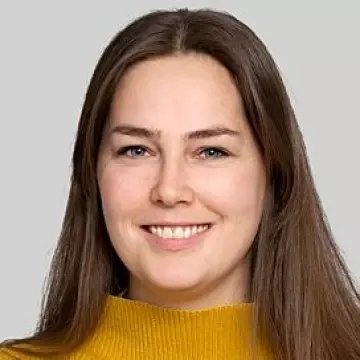Philosopher: If you want to be remembered in 100 years, you should consider this
In 100 years, everything will be forgotten. Or will it?

The young woman in the colour photograph knows little about the young woman in black and white.

Helene Rian Heggtveit is the same age as her great-grandmother, Helvig Heggtveit, was exactly 100 years ago.

What do we really know about relatives who lived back then?
And more importantly, what will our relatives remember about us?
In 100 years, you will be dead and buried, just like your parents, siblings, friends, and most likely your children.
Completely different people will be living in your house, mowing your lawn, and someone else will own everything that is left of what you have ever bought.
In 2125, your descendants will probably neither remember you nor know who you were.
Why is this so strange to think about?
We are not significant
“I think it's as simple as that we want to be noticed when we are alive,” says Espen Gamlund.
He is a professor of philosophy at the University of Bergen and has written the book Hva er døden? (What is death?) together with colleague Carl Tollef Solberg.
“The idea that we're forgotten says something about our time on this Earth, and that it's just a matter of a tiny microsecond. The planet and the world will do just fine without us,” he says.

Just to put it in perspective: The Earth is 4.5 billion years old, and humans like us have lived on it for about 300,000 years.
Our short 100 years, in other words, mean terribly little in the grand scheme of things.
“If we take that thought far enough, we might become a little depressed about how insignificant we are,” says Gamlund.
After all, that's how it is for most of us: Our passing will go unnoticed, except by our closest family members, friends, and colleagues.
People we remember
Some people will actually be remembered for generations to come. Donald Trump is probably one of them. But so are most of the American presidents before him.
In Norway, there are few politicians from the 1920s who have stuck in public memory. Do Norwegians know, for example, that Norway's prime minister in 1925 was Johan Ludwig Mowinckel from the Liberal Party?
On the other hand, even people from outside of Norway know of the polar explorers Nansen and Amundsen and the artist Edvard Munch. Perhaps Norwegians even remember some key figures from the women's movement, like Katti Anker Møller.
“Being remembered and written about has, in a way, been a justification for writing history and for life. At least if we go back to antiquity,” says historian Einar Lie.
There is evidence of this in diaries, memoirs, and written texts from major figures in history.
For them, making it into the history books was a goal in itself.
“But I don't think it's very common to think that way anymore,” he says.
Putting life into perspective
Philosopher Espen Gamlund believes we should instead focus on who we matter to while we are alive, and who will actually remember us.
“For most people, this is our closest family and friends. They will tell stories about us, look at pictures of us, and think about us for an undetermined number of years after we're dead,” he says.
Gamlund believes the question of how long we will be remembered can help put things in perspective.
“If you're going to care at all about the world after you're gone, maybe you should care about what kind of difference you can make for those you love. This means more than whether you changed the world, which very few of us manage to do anyway,” he says.
Einar Lie agrees:
“If you can provide support, meaning, and contribute where you are – especially to the people you interact with and meet along the way – then I think you've done well.”
Who are we really?
Lie is a Norwegian historian. He has written several books, given lectures, and participated in debates on radio, TV, and in newspapers.

But does he dream of being remembered for his accomplishments 100 years from now?
“No, I don't. I don’t think aiming to leave a lasting legacy far beyond your own lifetime leads to a balanced or happy life,” he says.
How ancestors were remembered in the past
Lie says that the traces of our ancestors are still visible, even those who lived 100 years ago.
“If we go quite far back in time to the old farming communities, memory, in a sense, lasted longer. Back then, families lived in the same place, inherited land and buildings, and left their mark in that way,” he says.
People often knew a lot about those who had lived on the farm in previous generations and what they had done.
“People simply left more physical traces than we do today,” says Lie.
He mentions the Norwegian TV series Der ingen skule tru at nokon kunne bu (Where no one would believe that someone could live) and people who live on old, abandoned farms in remote, rural Norway.

The people who live in these places know who built their house, the outhouse, the stairs, and who once created the large garden behind the house.
Amateur photographer helped Helvig be remembered
Helene Rian Heggtveit knows what her great-grandmother looked like, that she lived in Lårdal, and that she had five siblings.
She knows this because a relative created a family tree on MyHeritage.com, and because Helvig had two relatively well-known brothers – Hans and Einar Tveito.
Hans was an amateur photographer and took several photos of his family.
“Maybe that's precisely why he took photos, to be remembered?” wonders Heggtveit.
The other brother was the actor Einar Tveito. He worked at the Norwegian Theatre and has his own Norwegian Wikipedia page – just like his brother.
Curious readers can also learn that the siblings also had another brother and three sisters, that their mother was named Azora and their father Olaf, and that they ran the general store in Lårdal for several generations.


New, electronic traces
Thanks to Wikipedia, MyHeritage.com, and all the other digital platforms, Einar Lie believes the way we are remembered is changing.
We leave behind more digital footprints.
“An ordinary person today can't go through a normal day without leaving electronic traces,” says Lie, adding:
“These traces can remain for a long time, as long as we choose to keep and maintain the vast internet.”
This includes everything from public records and banking systems to Facebook and TikTok.
More information about us now
In 100 years, privacy concerns may have faded, and a lot of information about our health, finances, lives, and deaths may be publicly available, according to Lie.
“Social media platforms thrive on generating information about us, and partly sell that information for commercial purposes. This will largely continue,” he says.
Lie believes there will be an enormous amount of personal information about each of us online in 100 years.
“So potentially, there will be far, far more information available about us in 100 years than there is about those who lived 100 years ago,” he says.
The digital afterlife
Espen Gamlund also believes that remembering people will be easier in the future. He calls this ‘the digital afterlife.’
“We'll have a much larger and richer digital afterlife than our ancestors did 100 years ago,” he says.
We still do not fully understand how we will live on online – through images and texts.
“So our descendants might sit down one day and enjoy reading about us and everything we did,” he says.
Do we really just want to live forever?
Gamlund believes the desire to be remembered is closely tied to the desire to live longer.
“Some people think that the longer we live, the better,” he says.
If we could just cure all the diseases that kill us and delay ageing, we could extend our lives even further.
Some might even wish they could live forever.
“The idea of living forever feels to me like a very, very distant concept. I don't think it would be particularly interesting or meaningful to live much longer than we do today,” he says.
Image credits:
Images of Helvig Heggtveit: Hans Tveito / Vest-Telemark Museum
Images of Helene Rian Heggtveit: Private
———
Translated by Nancy Bazilchuk
Read the Norwegian version of this article on forskning.no

Subscribe to our newsletter
The latest news from Science Norway, sent twice a week and completely free.




































